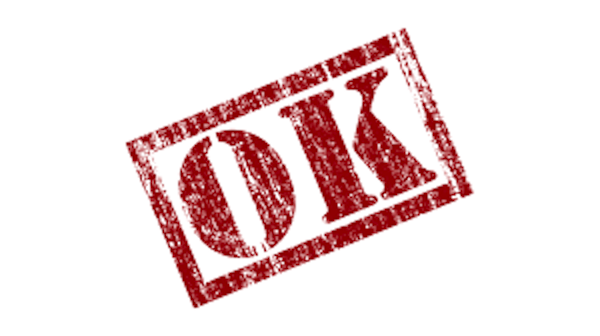(单词翻译:单击)
听力文本
Now, the VOA Learning English program, Words and Their Stories.
Millions of people all over the world use the word okay. In fact, some people say the word is used more often than any other word in the world.
It may be common, but no one can seem to agree on how the "OK" came to be. Faith Lapidus tells us more.
Okay means "all right" or "acceptable." It expresses agreement or approval. You might ask your brother, "Is it okay if I borrow your car?" Or if someone asks you to do something, you might say, "Okay, I will." Still, language experts do not agree about where the word came from.
Some people say it came from the Native American Indian tribe known as the Choctaw. The Choctaw word "okeh" means the same as the American word okay. Experts say early explorers in the American West spoke the Choctaw language in the nineteenth century. The language spread across the country.
But many people dispute this.

Language expert Allen Walker Read wrote about the word okay in reports published in the 1960s. He said the word began being used in the 1830s. It was a short way of writing a different spelling of the words "all correct." Some foreign-born people wrote "all correct" as "o-l-l k-o-r-r-e-c-t," and used the letters O.K.
Other people say a railroad worker named Obadiah Kelly invented the word long ago. They said he put the first letters of his names -- O and K -- on each object people gave him to send on the train.
Still others say a political organization invented the word. The organization supported Martin Van Buren for president in 1840. They called their group, the O.K. Club. The letters were taken from the name of the town where Martin Van Buren was born — Old Kinderhook, New York.
Not everyone agrees with this explanation, either. But experts do agree that the word is purely American. And it has spread to almost every country on Earth.
Then there is the expression A-Okay. This means everything is fine. A-Okay is a space-age expression. It was used in 1961 during the flight of astronaut Alan Shepard. He was the first American to be launched into space. His flight ended when his spacecraft landed in the ocean, as planned. Shepard reported: "Everything is A-Okay."
However, some experts say the expression did not begin with the space age. One story says it was first used during the early days of the telephone to tell an operator that a message had been received.
There are also funny ways to say okay. Some people say okey-dokey or okey-doke. These expressions were first used in the 1930s. Today, a character on the American television series,
"The Simpsons," says it another way. He says okely-dokely.
Thanks, Faith. This program was written by Shelley Gollust.
重点解析
1.agree on 对…取得一致意见
You and your spouse do not have to agree on politics.
你和你的配偶不必在政治上保持一致。
2.long ago 很久以前
That can't be Mr. Brown -- he left here long ago.
那个人不可能是布朗先生,因为他早就离开这里了。
3.launch into 进入;发射入
They launched at least 2 spaceships into outer space each year.
他们每年至少将2艘宇宙飞船发射到太空。
4.land in 在…着陆
Because the airport was closed, the pilot had to land the plane in an open field.
由于机场关闭,飞行员只得将飞机降落到一片旷野里。
参考译文
现在是VOA学英语《词汇掌故》栏目。
世界上每天有数百万人使用okay这个单词。实际上,有人说这个单词在世界上比任何单词都用得更多。
它可能很常见,但是对“OK”这词怎么来的没人能达成一致。以下是菲丝·拉伯蒂斯给我们带来更多内容。
Okay意思是好的,可以。它表示同意或批准。你可能会问你的兄弟,“我可以借你车吗?”或者如果有人让你做什么事,你可以说,“好的,我会的。”尽管如此,语言专家对这个词出自哪里意见不统一。
有人说,它来自被称之为乔克托族的美洲土著印第安部落。乔克托语“okeh”跟美式英语中的单词okay同义。专家表示,美国西部的早期探险者在19世纪说乔克托语,这种语言传播到了全国。
但很多人对此持有异议。
语言专家艾伦·沃克·瑞德撰写了有关okay这个单词的报道发表在20世纪60年代。他说,这个词在19世纪30年代开始被使用。它是all correct另一种拼写的缩写。一些外国出生的人把all correct写成oll korrect,并用O.K.作为缩写。
另一些人说,一位名为俄巴底·凯利的铁路工人发明了这个单词。他们说,他把自己名字的首字母O和K写在人们交给他送上火车的每个物体上面。
还有人说,一家政治组织发明了这个单词。该组织在1840年支持马丁·范布伦竞选总统。他们称自己的组织是O.K. Club。这些字母取自范布伦出生的小镇--纽约的Old Kinderhook。
也不是每个人都同意这个解释。但是专家们一致认为,这个单词是纯粹美国英语,而且它已经传播到地球上的几乎每一个国家。
再有就是A-Okay这种表达。这意味着一切都好。A-Okay是一种太空时代的表达。1961年宇航员艾伦·谢泼德在飞行期间用到了它。他是首位被送上太空的美国人。他的飞行以飞船按计划降落到海洋中结束。谢泼德报告说,“Everything is A-Okay.”
然而,一些专家表示,这种表达并非始于太空时代。一种说法称,它最初被用于电话的早期时来告诉操作员消息已经收到。
还有一些说okay的有趣方式。有人说okey-dokey,或者okey-doke。这些表达最初用于20世纪30年代。如今,电视连续剧《辛普森一家》中的一位角色用了另一种说法,他说的是okely-dokely。
谢谢菲丝。本期节目是由Shelley Gollust撰写的。


